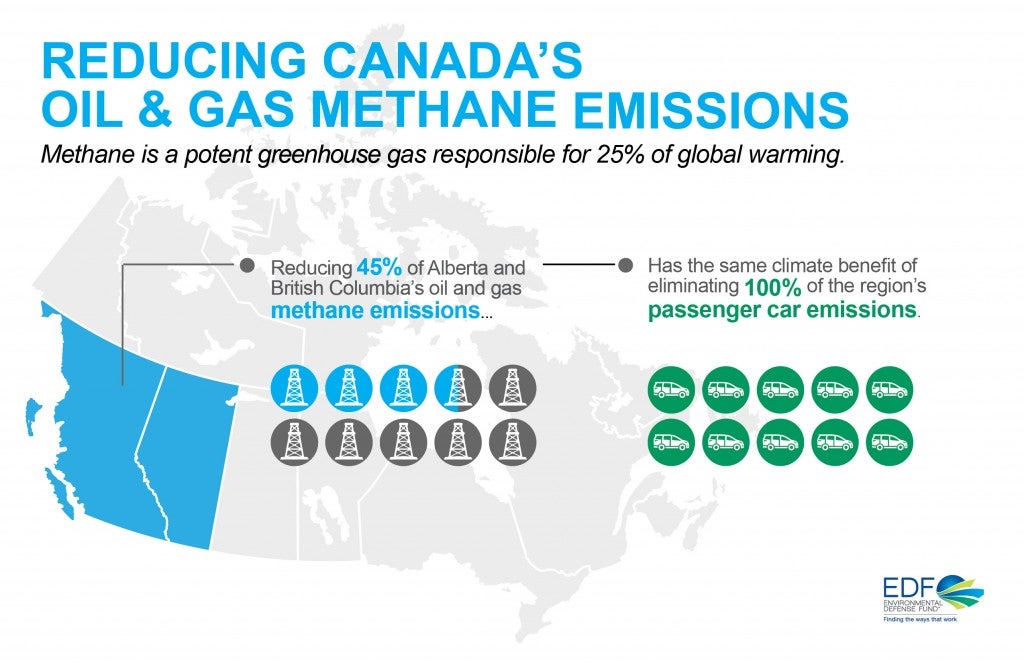 A new analysis out today shows Canada’s oil and gas sector can achieve substantial cuts in emissions of methane – a powerful pollutant and the primary ingredient in natural gas – using low-cost pollution controls. Conducted by ICF International, the independent report evaluated the many reduction opportunities for Canada’s oil and gas industry to curb harmful and wasteful methane emissions. EDF commissioned the study and released it in partnership with the Pembina Institute, Canada’s leading clean energy think tank.
A new analysis out today shows Canada’s oil and gas sector can achieve substantial cuts in emissions of methane – a powerful pollutant and the primary ingredient in natural gas – using low-cost pollution controls. Conducted by ICF International, the independent report evaluated the many reduction opportunities for Canada’s oil and gas industry to curb harmful and wasteful methane emissions. EDF commissioned the study and released it in partnership with the Pembina Institute, Canada’s leading clean energy think tank.
Natural gas is about 95 percent methane and packs a climate warming punch 84 times more powerful than carbon dioxide in the first 20 years after it is released. Because of its short-term potency, methane accounts for 25 percent of the global warming we feel today.
Canada is the fourth largest global emitter of oil and gas methane emissions, according to a Rhodium Group analysis. Better controlling these emissions across Canada can provide instant benefits to the climate and for public health (methane is emitted along with other toxic pollutants that lead to smog), while also saving millions in wasted natural gas. And, even better, we now know that reducing these emissions in Canada is highly cost-effective, similar to the conclusion of an earlier ICF analysis done for the U.S.
The latest ICF report shows that using low-cost and existing technologies Canada can significantly curb its methaneemissions, estimating that the Canadian oil and gas sector can slash emissions by 45 percent below projected 2020 levels. This reduction would be the equivalent of eliminating 27 million tons of carbon dioxide. Expressed differently, this sizable reduction would be like removing all the cars from the roads in the Canadian provinces of both Alberta and British Columbia. That’s a big climate benefit that can be achieved for very little cost.
Not only are these reductions attainable, the study shows that the costs to do so are reasonable. In fact, achieving this 45 percent reduction would cost less than one cent per Mcf of gas produced, which comes out to CAD $2.76 (about US$ 2) per metric ton of CO2e reduced. This is incredibly cheap compared to other GHG mitigation options. To implement systems to reduce and eliminate methane leaks and reduce direct venting, the estimated cost to the Canadian oil and gas industry is less than 1 percent of their annual capital spending budget, according to Oil and Gas Journal data. Also, by reducing methane emissions, there are potential revenue opportunities for oil and gas companies to recover and sell gas that is currently lost.
Digging into the findings further, there are opportunities at the subnational level for the provinces of Alberta and BC to attain significant reductions as well. Alberta and BC are Canada’s main oil and gas producing regions, responsible for nearly 70 percent of Canada’s total methane emissions. This research is particularly well timed as both provinces are focused on developing climate plans.
In particular, the Alberta Climate Change Advisory Panel is wrapping up its consultations with the community designed to inform a new action plan on climate change for the Province of Alberta. Knowing that methane makes up about 11 percent of all greenhouse gas emissions in Alberta, EDF and the Pembina Institute submitted this new report to the Panel and met with government officials to urge them to consider a specific methane policy goal in the Province’s climate strategy.
Similar to the national findings, the report estimates upstream emissions of methane from Alberta’s oil and gas sector can be reduced by 45 percent below projected 2020 levels by targeting equipment and facilities in the production, gathering, and processing segments. In the case of British Columbia, the report estimates a 37 percent reduction below projected 2020 levels. Emission sources from the midstream and downstream sector are not included at the provincial level. Nor does the analysis include methane emissions associated with oil sands mining.
While Alberta and BC have taken steps to limit methane to date, there is much more that can be done to reduce methane through sensible regulation. The report clearly shows that greater reductions are possible and cost-effective. And that there is a significant opportunity for Canada to make strides towards meetings its climate change goals, if it addresses oil and gas methane emissions. These findings are helpful and timely for those policy makers tasked with developing new climate plans and those preparing for international climate meetings in Paris in December.
EDF and the Pembina Institute will be watching developments in the coming months as the Alberta Climate Advisory Panel reports its recommendations for the new climate plan. We’re looking forward to continuing the dialogue with policy makers in Canada and the U.S. and beyond about this important issue.









